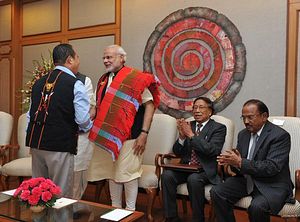As The Diplomat‘s Sanjay Kumar reported from India last week, the Indian government and the National Socialist Council of Nagaland (Isak-Muivah), known as NSCN(IM), unexpectedly and suddenly announced that they had reached a historic peace agreement. The NSCN(IM) is one of many rebel groups in the Indian northeast that have for years fought the imposition of order by a government they see as distant and insensitive to their demands for greater self-governance and autonomy (in most cases). The NSCN(IM), specifically, sought the creation of a contiguous region for the Naga people, known as Nagalim.
Though the peace agreement was initially welcomed by observers, it had the odd feature of being incredibly opaque, both in process and outcome. Narendra Modi, the Indian prime minister, announced the deal with Thuingaleng Muivah, one of the leaders of the NSCN(IM), very publicly. The agreement was trumpeted on social media: In a tweet on August 3, the day the deal was announced, Modi noted, “Today, we mark not merely the end of a problem but the beginning of a new future.”
Yet as of this writing, the Indian government has not publicized the details of the agreement. Given the sudden nature of the announcement and the wide range of demands that NSCN(IM) had sought over the course of their insurgency, observers in the Indian media are beginning the question the sort of concessions the government may have committed to in the agreement. What’s more, on Saturday, reports emerged that the Indian Ministry of Home Affairs, the cabinet-level ministry responsible for domestic policy and internal security in India, had not even seen the agreement itself. According to The Hindu,the ministry sought clarification from the chief of the Joint Intelligence Committee, R.N. Ravi, the man who negotiated the deal with the NSCN(IM) on behalf of the central government.
That same Hindu report noted that the NSCN(IM) “has been assured of ‘autonomous councils'” per the agreement. The broader demand of the NSCN(IM) for “shared sovereignty,” however, is not part of the deal. The central government’s decision to go ahead with this deal without consultation with the state governments in the northeast, including the governments of Assam, Arunachal Pradesh, Manipur, and Nagaland, could leave the implementation of the peace accord on shaky ground. Northeastern state leaders have in the past rejected demands for further autonomy by insurgent groups, and may find the autonomy provisions in the peace agreement troubling.
































